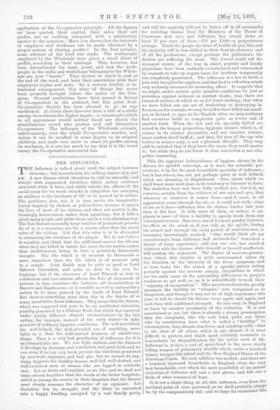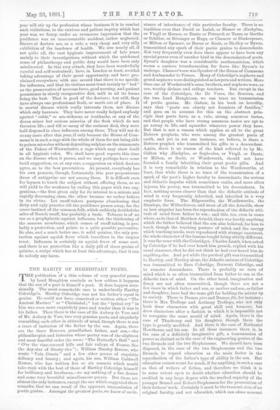THE INFLUENZA.
THE Influenza is talked about until the subject becomes tiresome ; but nevertheless, the talking cannot stop just yet. A new disease which threatens to visit us annually, and always with augmented virulence, which makes existence miserable while it lasts, and which selects the officers of the social army for its worst attacks, is altogether too annoying an addition to the incidents of life to be passed by in silence. The pestilence does not, it is true, excite the imaginative horror inspired by cholera or yellow-fever, because it spares the lives of most of its victims, and when not mortal, is dis- tressingly inconvenient rather than agonising; but it kills a great many people, and picks them out in a very alarming way. The fact that an unusually large number of prominent persons die of it, is a menacing one for a reason other than the social value of the victims. Not that this value is to be discarded in estimating the virulence of the plague. We do not believe in equality, and think that the additional sorrow for officers, when they are killed in battle, has sense for its motive rather than snobbishness, being, in fact, a genuinely democratic thought. The life which is of moment to thousands is more important than the life which is of moment only to a couple. John Smith may be quite as good as Lord Edward Cavendish, and quite as dear to his own be- longings ; but if the character of Lord Edward as heir to a dukedom and vast estates affects the fate. 9f thousands of persons in four counties—for instance, all householders in Barrow and Eastbourne—it is sensible as well as natural for a nation to be more grieved by the death of Lord Edward. But there is something more than this in the deaths of so many notabilities from influenza. They mean that the disease, which was supposed last year to be an accidental visitation, possibly generated by a Chinese flood, but which has recurred under totally different climatic circumstances—in the late spring, for example, instead of the early winter—is inde- pendent of ordinary hygienic conditions. The well-nourished, the well-lodged, the well-attended are, if anything, more liable to it than the half-starved denizens of odoriferous slums. That is a very bad peculiarity of influenza, for it is an irremediable one. We can fight malaria and the diseases it develops by drainage and ventilation and good food, and we can even, if we try very hard, prevent the liabilities generated by overwork, exposure, and bad gin; but we cannot do any- thing hygienic for healtby houses, well-fed, well-clothed, and well-exercised men, or women who are lapped in scientific care. Let us drain and ventilate as we like, and we shall not make streets healthier than the wards of the better hospitals ; and it is among the nurses in those hospitals that the disease most closely assumes the character of an epidemic. Let Socialism win its struggle, and the State be converted into a happy dwelling occupied by a vast family party,
and still the majority will not be better off in all necessaries for resisting disease than the Members of the House of Commons now are ; and influenza has struck down at least 15 per cent. of them-150 per 1,000—a preposterous average. Teach the people the laws of health all you like, and the majority will be less skilled in them than the doctors; and of all the professions, except perhaps the politician's, the doctors are suffering the most. The Lancet could tell the strangest stories of the way in which popular and kindly physicians have been suddenly overwhelmed and overworked by requests to take up urgent cases for brethren temporarily but completely prostrated. The influenza is a law to itself, a pest with inexplicable caprices, and that fact to reflecting minds very seriously increases its menacing effect. It suggests that we might, under certain quite possible conditions, be just as powerless against sickness as against death ; that there are causes of malaise of which we as yet know nothing ; that when we have killed out one set of weakening or destroying in- fluences, as for example, we may be said to have killed out small- pox in Ireland, or ague in the English cities, we may suddenly find ourselves liable to complaints quite as severe and of another kind. When the rich and the specially skilled are seized in the largest proportion, hygienic science, which is, of course, in its essence preventive and not curative science, must confess itself baffled; and that, for men of the age who believe in science only, is not a pleasant thought. They may still be satisfied that if they knew the cause, they could master it ; but while they do not know it, that conviction is not alto- gether reassuring.
This, the apparent independence of hygiene shown by the disease, its spiteful contempt, as it were, for scientific pre- cautions, is by far the most formidable specialty of influenza; but it has others, too, not yet perhaps quite so well defined, which are alarming to Englishmen. One, about which we shall know more next year, is its tendency to increase in force. The statistics have not been fully verified yet ; but it is, we conceive, certain, from the evidence of our ears and eyes, that wherever or whatever it comes from—and it must, to all appearance, come through the air, or it could not strike ships at sea as it does—influenza hits its victims harder this year than it did last. It kills more of them, or rather, it im- plants in more of them a liability to speedy death from any subsequent seizure. Moreover, one of its most painful features, its effect on the mind, or, if you will, on the spirits, during the attack and through the early period of convalescence, is becoming increasingly marked. " One would think all my convalescents from influenza had melancholia," remarked a doctor of large experience ; and any one who has watched relatives with the disease, while himself or herself unaffected, will confirm the statement. The degree of nervous prostra- tion which this implies is quite unwarranted either by the duration or the intensity of the fever symptom, and at least looks like the action of a specific poison acting potently against the nervous energy, inequalities in which are the main cause of the astounding differences in people's readiness to get well, or, as it is scientifically termed, their " capacity of recuperation." This pseudo-melancholia greatly increases the liability to "relapses," now recognised as so dangerous, and though it may not be of high importance this year, it will be should the disease recur again and again, and each time with additional strength. So also may, in England at least, be another peculiarity of the visitation. It is not ascertained as yet, but there is already a strong presumption that the complaint, like the east wind, picks out those who by constitution have what is called a " liability " to consumption, lung-disease, low-fever, and catching cold,—that is, the class of all others which in our climate it is most difficult to protect, and which most certainly transmits to descendants its disqualification for the active work of life Influenza is, in fact, a sort of spear-head to the more slowly killing weapon of pulmonary trouble which, under a hundred names, ravages this island and the New England States of the American Union. No such addition was needed; and there are a hundred thousand households in England, often the very best households, over which the mere possibility of an annual visitation of influenza will cast a new gloom, and kill out a little of what remained of hope.
It is not a slight thing at all, this influenza, even from the national point of view, governed, as we shall probably always be, by the comparatively old ; and we hope its recurrence this
year will stir up the profession whose business it is to combat such visitations, to the anxious and patient inquiry which last year was, we fancy, under an erroneous impression that the pestilence was an unaccountable accident, rather neglected. Sneers at doctors are, as a rule, a very cheap and very silly exhibition of the insolence of health. We owe nearly all, if not quite all, the vast hygienic improvement of late years mainly to their investigations, without which the quickened sense of philanthropy and public duty would have been only misdirected, In this very attack, they have been wonderfully careful and self-restrained; have, in London at least, avoided taking advantage of their great opportunity, and have pro- claimed everywhere with one accord that there is no specific for influenza, and that its victims must trust mainly to " bed" as the preservative of nervous force, good nursing, and patient persistence in slowly recuperative diet, milk in all its forms being the best. That is good of the doctors ; but still, they have always one professional fault, or merit out of place. It is mortal disease which really interests them, not disease which only harasses. They have never really helped anybody against " colds," or sea-sickness, or toothache, or any of the dozen minor but serious miseries of the flesh which do not threaten life ; and till so many of the eminent died, they were half-disposed to class influenza among these. They will not do so any more after this year, if only because the House of Com- mons is in such a rage with the whole of them for not being able to poison microbes without depositing sulphur on the ornaments of the Palace of Westminster, a rage which may show itself in all hygienic votes. We shall have good reports this time on the disease when it passes, and we may perhaps have some lucid suggestion, or, at any rate, a suggestion on which doctors agree, as to the best preventives. At present, everybody has his own panacea, though, fortunately, this year preposterous doses of antipyrine are not among them, It is difficult even for laymen to touch the subject without offering them, so we will yield to the weakness by ending this paper with two sug- gestions,—the first given only for its interest to a minute and rapidly decreasing class, the other because we rather believe in its virtue. Let snuff-takers postpone abandoning that dirty and ugly practice till the pestilence passes away, for the queer instinct of the common folk, which suddenly doubled the sales of Scotch snuff, has probably a basis. Tobacco is of no use as a prophylactic against influenza, but the thickening of the mucous membrane, which comes of snuff-taking, is pro- bably a protection, and points to a quite possible preventive. So also, and a much better one, is solid quinine, the only pro. tection against aguish fever which travellers in the tropics trust. Influenza is certainly an aguish fever of some sort, and there is no protection like a daily pill of three grains of quinine, a recipe which has at least this advantage, that it can do nobody any harm.



































 Previous page
Previous page